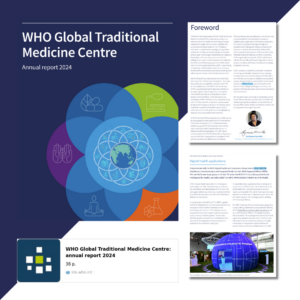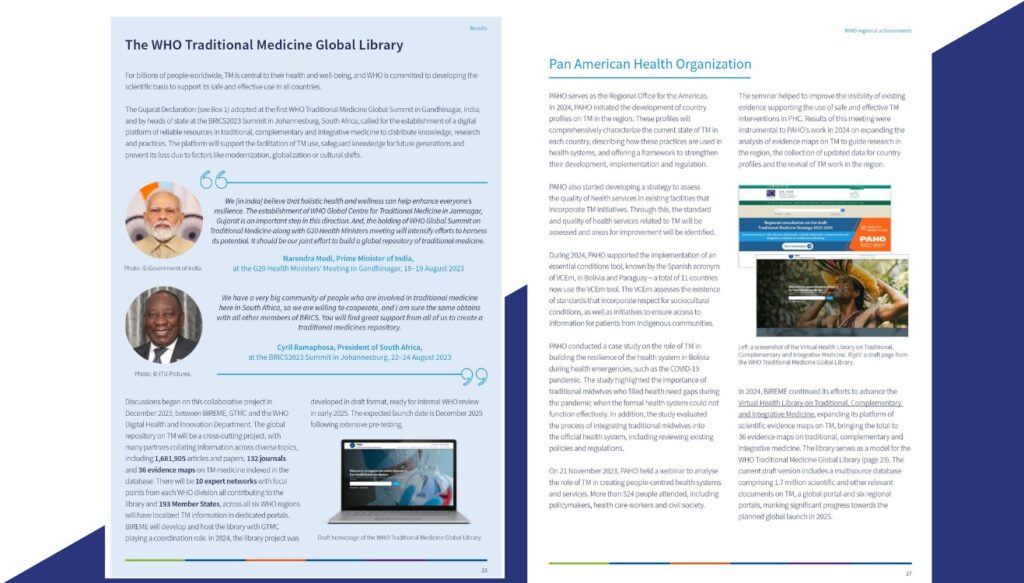
The Division of Universal Health Coverage and Life Course of the World Health Organization (WHO) coordinated the publication of the WHO Global Traditional Medicine Centre (GTMC) annual report, published on May 23, 2025, and available online in English (click here to access). The document includes its main results clustered into: (1) Leadership and political engagement; (2) Traditional Medicine Global Summit; (3) Research and evidence; (4) Primary health care and universal health coverage; (5) Indigenous knowledge and biodiversity; (6) Digital health applications; (7) WHO and Government of India coordination; and (8) Human resources, budget and financing.
The WHO Regional Offices collaboration is also considered as regional achievements and the Pan American Health Organization (PAHO), that also serves as WHO Regional Office for the Americas, has shared its technical cooperation activities. The Latin American and Caribbean Center on Health Sciences Information (BIREME), has shared the developments on WHO Traditional Medicine Global Library (TMGL) highlighting its strategic role in evidence-informed decision-making, research prioritization, and the integration of Traditional, Complementary, and Integrative Medicine (TCIM) knowledge into health systems worldwide.
TMGL: WHO Traditional Medicine Global Library
The WHO TMGL, currently in its Beta version (v.02), is a collaborative digital initiative developed by BIREME in partnership with the WHO GTMC. Designed to provide global access to knowledge in TCIM, TMGL serves researchers, practitioners, policymakers, and the public by indexing, archiving, and facilitating access to a broad range of TCIM-related resources.
Approved by the 78th World Health Assembly on May 26, 2025, the new “WHO Global Traditional Medicine Strategy 2025-2034” directs the international community to develop an inclusive and comprehensive evidence base to support the introduction of effective and safe TCIM practices into national health systems, as deemed appropriate by each country. “In this process, the TMGL will play a key role as a conduit of knowledge that bridges the gap between traditional knowledge, scientific evidence and the practical implementation of this knowledge in health systems,” said João Paulo Souza, director of BIREME, on the approval of the document by the Member States.
A key initiative under WHO’s traditional medicine strategy, TMGL benefits from direct financial contribution from India and in-kind contributions from multiple partners, including all six WHO regional offices, which have played a role in shaping its global research prioritization framework on traditional medicine. The library curates, organizes, and provides structured access to external scientific and technical literature, ensuring visibility for high-quality TCIM research worldwide.
PAHO’s Regional Efforts in TCIM and BIREME’s Role
As part of its broader efforts to strengthen traditional, complementary, and integrative medicine across the Americas, PAHO has been actively implementing initiatives that complement TMGL and the mission of the Virtual Health Library on Traditional, Complementary, and Integrative Medicine of the Americas (TCIM VHL Americas). In 2024, PAHO initiated the development of country profiles on TCIM, as highlighted in the WHO GTMC Technical Report 2024, providing a comprehensive characterization of how these practices are integrated into national health systems.
In parallel, PAHO launched a strategy to assess the quality of health services in facilities incorporating TCIM, ensuring standardization and identifying areas for improvement. PAHO supported the implementation of the essential conditions tool (VCEm) in Bolivia and Paraguay in 2024, assessing how national standards incorporate respect for sociocultural conditions and ensure access to information for Indigenous communities.
As a PAHO specialized center, BIREME plays a key role in supporting these initiatives by ensuring that relevant information is accessible through TCIM VHL and that the knowledge generated through these efforts contributes to TMGL’s global knowledge base.
TCIM VHL Americas: A Key Driver in TMGL Development
In shaping the TMGL, WHO has not only drawn inspiration from the TCIM VHL Americas, but has also leveraged the expertise and methodologies developed through this VHL to build the foundation of its global library’s structure, content curation, and expansion.
Developed by BIREME, the TCIM VHL Americas serves as a regional model for TMGL, demonstrating a structured, evidence-based approach to knowledge management in TCIM. However, its contribution extends beyond serving as a reference model — it has actively shaped TMGL’s development through specialized expertise in content curation, thematic structuring, and database expansion.
Key contributions of TCIM VHL Americas experts to TMGL include mapping vital content for inclusion in the portal, curating information to ensure high-quality, relevant, and structured access to TCIM resources, and developing a TCIM thematic structure to guide data collection across databases and repositories. Additionally, their expertise has contributed to the expansion of TMGL’s databases, including curating content from major global events, and developing inclusion criteria for TMGL content and resources to ensure scientific rigor and reliability in the materials made accessible through the platform.
Reflecting on this strategic collaboration, João Paulo Souza, Director of BIREME, emphasized its institutional importance: “The collaboration with the GTMC for the development of the TMGL represents a milestone for BIREME, as it strengthens our mission to expand access to quality information for health workers, researchers, academics, policymakers, and the public. In addition, it drives innovations in our products and services, with the potential for application across our entire portfolio, and enables us to contribute directly to the establishment of a sister entity of BIREME within WHO, considering that the GTMC is a WHO Specialized Centre in Traditional Medicine, just as BIREME is in health information sciences.”
By leveraging the expertise, methodologies, and curated content developed through TCIM VHL, TMGL is positioned to expand its global reach, ensuring traditional medicine knowledge remains structured, accessible, and impactful for practitioners, policymakers, and researchers across the world.
Strengthened access to knowledge in traditional medicine
The inclusion of the TMGL and the TCIM VHL Americas in the WHO GTMC Annual Report reinforces its strategic importance for traditional medicine in the context of global health. BIREME, in partnership with the WHO and its global collaborators, continues to strengthen the information infrastructure in TCIM, promoting access to scientific evidence and supporting the integration of traditional knowledge into health systems.
The development of the Global Library of Traditional Medicine has advanced significantly in recent months. To follow the previous stages of this project and understand how BIREME and the TCIM VHL Americas have contributed to its construction, access the news already published in the BIREME Bulletin:
- New stage of development of the WHO Traditional Medicine Global Library
- Advances in the development of the Traditional Medicine Global Library
- Progress on the WHO Traditional Medicines Global Library
- BIREME will coordinate the development of the WHO Traditional Medicine Global Library
- TCIM VHL Americas will serve as a model for the development of the future WHO Traditional Medicine Global Library
The TMGL and the TCIM VHL Americas continue to evolve as global references in access to knowledge in traditional medicine. Follow the updates in the BIREME Bulletin to learn more about the next advances of this initiative.
